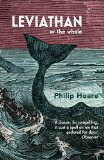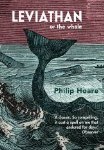 Winner of the 2009 BBC Samuel Johnson Prize for Non-Fiction
Winner of the 2009 BBC Samuel Johnson Prize for Non-Fiction
Five words from the blurb: whales, humans, Melville, history, gigantic
I didn’t mean to read Leviathan this month, but I picked up a copy and couldn’t put it down. Leviathan contains everything that you’d ever want to know about whales; including their natural history, their interactions with humans and their role in literature.
The book was packed with the type of facts that I love – almost every other page contained something that I wanted to share with whoever happened to be closest to me. My family began mocking my new obsession with whales, but how can you not want to share a fact like this?!
A sperm whale can create a two-hundred-decibel boom able to travel one hundred miles along the ‘sofar’ channel, a layer of deep water that readily conducts noise. It seems strange that such a physically enormous creature should rely on something so intangible; but bull sperm whales, by virtue of their larger heads, generate sounds so powerful that they may stun or even kill their prey. These directional acoustic bursts, focused through their foreheads and likened to gunshots, are the equivalent, as one writer notes, of the whale killing its quarry by shouting very loudly at it.
I also discovered:
- A sperm whale can eat 700 squid in one day.
- Sperm whales were not filmed underwater until 1984.
- A killer whale used to live in Windsor Safari Park.
- A man is said to have been recovered alive from the stomach of a sperm whale several hours after being eaten by it.
I now have the ability to talk about whales for several hours!
One slight problem I had with the book was that I hadn’t read Moby-Dick. I’m sure that some of the sections would have been more meaningful had this been the case, but it has at least persuaded me to read it soon.
The only other tiny issue I had was that most of the photographs were very small and grainy. I can understand why this would be the case for the older examples, but even some of the more modern ones were unclear. This book would have been improved greatly with the addition of a few larger, clearer photographs.
On a more positive note, I thought the writing was fantastic. It effortlessly guided the reader from one topic to the next; managing to move from lighter humor to the darker aspects of whaling without any drop in pace.
I loved this book and will be forcing it into the hands of several people over the coming months. I highly recommend that you get hold of a copy.
